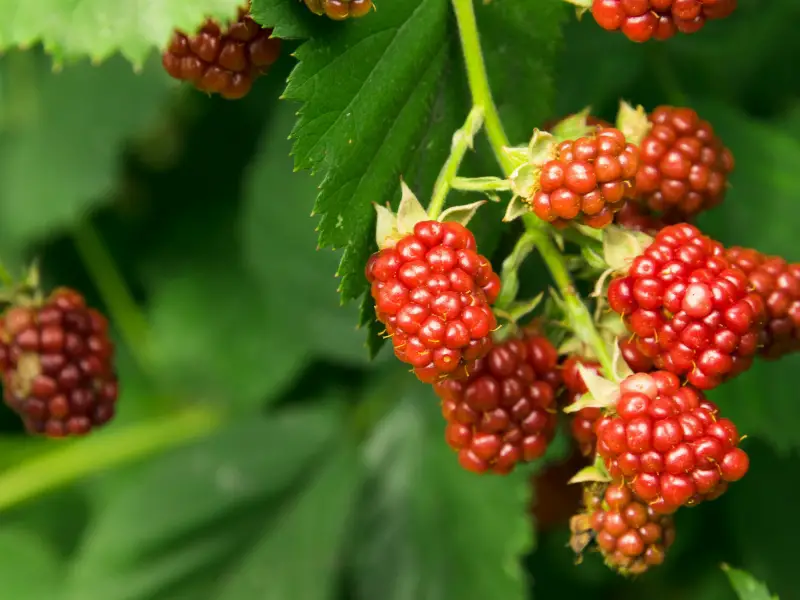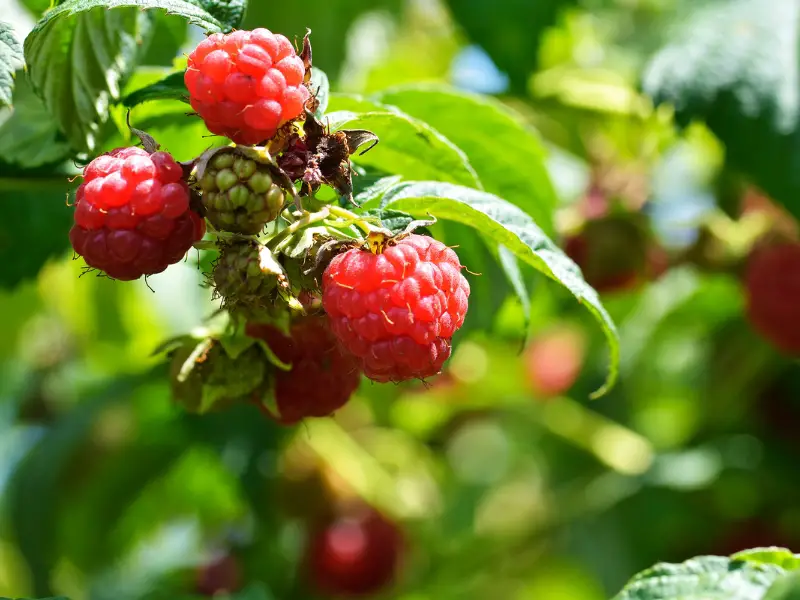Rabbits are adorable creatures that make great pets. They are herbivores and require a diet that consists of hay, fresh vegetables, and fruits. While it’s easy to provide hay and vegetables to your furry friend, you might be wondering about the safety of feeding them fruits. In particular, can rabbits eat raspberries?
Raspberries are a popular fruit that is enjoyed by many people. They are packed with vitamins and antioxidants, making them a healthy addition to any diet. However, when it comes to feeding them to rabbits, there are a few things to consider. In general, rabbits can eat raspberries, but it’s important to do so in moderation. Too many raspberries can cause digestive issues, such as diarrhea, which can be harmful to your pet’s health.
It’s also important to note that raspberries should be given as a treat and not as a staple food in a rabbit’s diet. While they are a good source of vitamins and antioxidants, they are also high in sugar. Feeding your rabbit too many sugary treats can lead to obesity and dental problems. As with any new food, it’s important to introduce raspberries slowly and monitor your rabbit’s reaction to them.
Can rabbits eat raspberries with skin?
Rabbits can eat raspberries with skin, but it is recommended to wash them thoroughly before feeding them to your furry friend. Raspberries are a great source of vitamins and minerals, including vitamin C, fiber, and antioxidants. However, they also contain sugar, so it’s important not to overfeed your rabbit with raspberries.
It’s also important to note that raspberries should be given to rabbits as a treat and not as a staple food. Rabbits need a balanced diet that includes hay, fresh vegetables, and a small amount of pellets. Too many raspberries can upset a rabbit’s digestive system and lead to health problems.
When feeding raspberries to your rabbit, it’s best to start with a small amount and monitor their reaction. Some rabbits may have allergies or sensitivities to certain foods, including raspberries. If your rabbit experiences any adverse reactions, such as diarrhea or vomiting, stop feeding them raspberries immediately and consult with a veterinarian.
In summary, rabbits can eat raspberries with skin, but it’s important to feed them in moderation and as a treat rather than a staple food. Always wash raspberries thoroughly before feeding them to your rabbit, and monitor their reaction to ensure they don’t have any adverse effects.
Benefits of Feeding Raspberries to Rabbits

Rabbits are herbivores and require a diet that is high in fiber and essential nutrients. While hay and fresh vegetables are essential components of a rabbit’s diet, fruits like raspberries can also be a healthy addition. Here are some benefits of feeding raspberries to rabbits:
High in Fiber
Raspberries are a great source of fiber, which is essential for maintaining a healthy digestive system in rabbits. The fiber content in raspberries can help prevent digestive problems like diarrhea and constipation.
Rich in Antioxidants
Raspberries are also rich in antioxidants, which can help protect rabbits from free radicals that can cause cellular damage. Antioxidants can also help boost a rabbit’s immune system and reduce the risk of chronic diseases.
Low in Sugar
Raspberries are relatively low in sugar compared to other fruits, which makes them a great option for rabbits. High sugar intake can lead to obesity and dental problems in rabbits, so it’s important to choose fruits that are low in sugar.
Source of Vitamins and Minerals
Raspberries are a good source of vitamins and minerals that are essential for a rabbit’s health. They contain vitamin C, which can help boost a rabbit’s immune system, and vitamin K, which is important for blood clotting. Raspberries also contain minerals like potassium, magnesium, and calcium, which are important for maintaining strong bones and muscles.
Overall, raspberries can be a healthy addition to a rabbit’s diet when given in moderation. It’s important to remember that fruits should only make up a small portion of a rabbit’s diet, and should be given in small amounts to avoid digestive problems.
Risks of Feeding Too Many Raspberries to Rabbits
Rabbits love to munch on sweet fruits, including raspberries. However, feeding too many raspberries to rabbits can have some risks. It is important to know what these risks are before giving your furry friend too many raspberries.
Digestive Problems
Rabbits have sensitive digestive systems, and feeding them too many raspberries can cause digestive problems such as diarrhea and bloating. Raspberries are high in fiber, which is beneficial for rabbits, but too much fiber can also cause digestive issues.
Obesity
Feeding too many raspberries to rabbits can also lead to obesity. Raspberries are high in sugar and calories, and overfeeding can lead to weight gain. Obesity can cause health problems such as arthritis, heart disease, and diabetes in rabbits.
Dental Problems
Rabbits’ teeth grow continuously, and they need to chew on fibrous foods to wear them down. However, feeding too many raspberries can lead to dental problems. Raspberries are soft and do not require much chewing, which can cause the teeth to overgrow and lead to dental issues.
Conclusion
In conclusion, while raspberries can be a tasty treat for rabbits, feeding too many can have some risks. It is recommended to limit the amount of raspberries given to rabbits and to provide a balanced diet that includes hay, fresh vegetables, and a small amount of fruit.
How many raspberries can I give my rabbit?
Rabbits love to munch on fresh fruits, and raspberries are one of the many fruits that they can enjoy. However, it is essential to feed them in moderation as too much of anything can be harmful to their health.
A rabbit’s diet should consist mainly of hay, fresh vegetables, and a limited amount of fruits. The recommended serving size of raspberries for a rabbit is one or two berries per week.
Raspberries are high in sugar, and overfeeding them can lead to digestive problems such as diarrhea and obesity. It is crucial to monitor the rabbit’s reaction to raspberries and adjust the serving size accordingly.
It is also important to note that raspberries should be given to rabbits as a treat and not as a substitute for their regular diet. A balanced diet is crucial for a rabbit’s health and well-being.
In summary, rabbits can enjoy raspberries as a treat, but it is essential to feed them in moderation. One or two berries per week is the recommended serving size to avoid any digestive problems.
Can Baby Rabbits Eat Raspberries?
Rabbits are adorable creatures that are known for their love of carrots, but can they eat other fruits like raspberries? Baby rabbits, in particular, have delicate digestive systems that require special care and attention. In this section, we will explore whether it is safe for baby rabbits to eat raspberries.
Overview
Raspberries are a delicious and nutritious fruit that is packed with vitamins and antioxidants. They are a great source of fiber, which can help regulate the digestive system. While raspberries are safe for adult rabbits to eat in moderation, it is important to consider whether they are suitable for baby rabbits.
Nutritional Value
Raspberries are a rich source of vitamins and minerals, including vitamin C, vitamin K, and manganese. They are also high in fiber, which can help regulate digestion and prevent constipation. However, raspberries are also high in sugar, which can be harmful to baby rabbits.
Risks
Feeding baby rabbits too many raspberries can lead to digestive problems, such as diarrhea or bloating. The high sugar content in raspberries can also cause tooth decay and obesity in rabbits. It is important to introduce new foods to baby rabbits slowly and in small quantities to avoid upsetting their delicate digestive systems.
Conclusion
In conclusion, while raspberries are a nutritious and delicious fruit, they should be given to baby rabbits in moderation. It is important to monitor their intake and introduce new foods slowly to avoid any digestive problems. If you are unsure whether a particular food is safe for your baby rabbit to eat, it is always best to consult with a veterinarian.
Related Articles:

